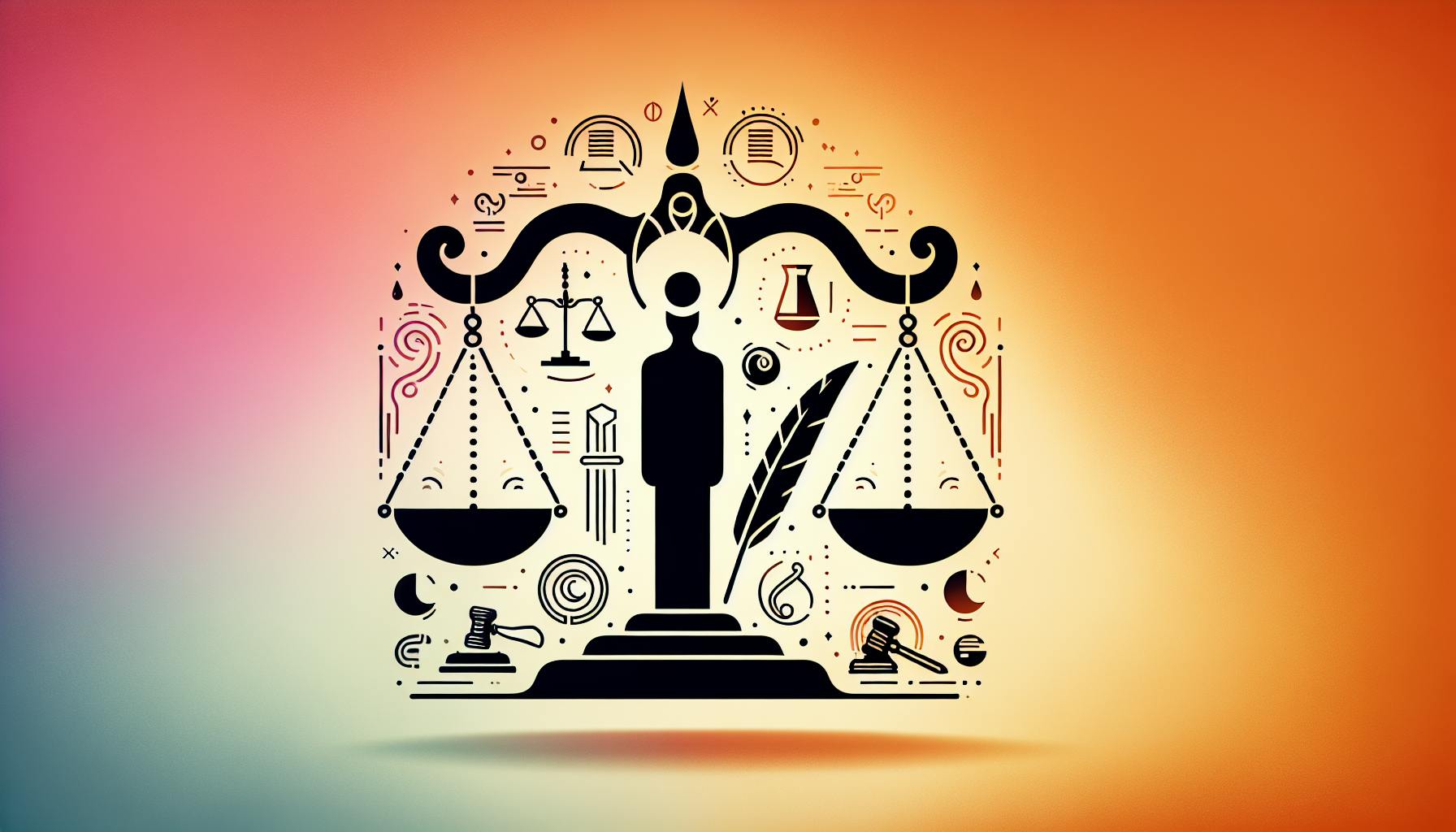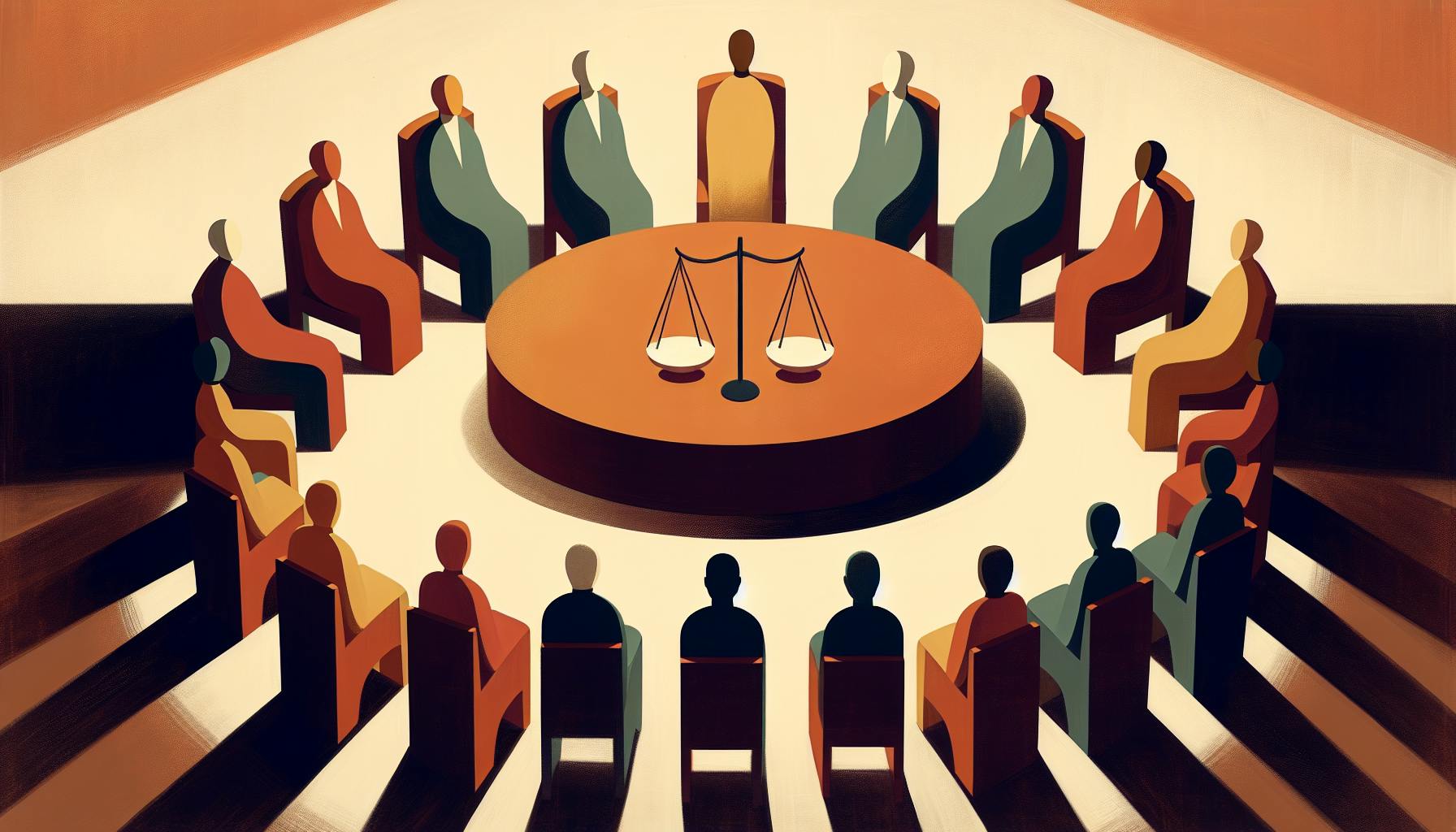Most people would agree that understanding the nuances between legal outcomes like acquittals and not guilty verdicts is confusing.
By examining key differences between acquittals, not guilty verdicts, and related legal outcomes, this article will provide clarity on what each means and how they impact cases.
You'll learn the precise meaning of an acquittal, how it differs from a not guilty verdict, the role of burden of proof and weak evidence in shaping trial outcomes, and best practices for legal teams to advise clients after a favorable verdict.
Introduction to Acquittal and Not Guilty Verdicts
This section provides a high-level overview of key differences between an acquittal and a not guilty verdict in criminal trials. Understanding these differences is important for legal professionals to correctly interpret trial outcomes.
Understanding 'Found Not Guilty' Meaning
Being found not guilty means the prosecution failed to prove the defendant's guilt beyond a reasonable doubt. The defendant is presumed innocent unless the prosecution definitively proves otherwise. A not guilty verdict does not necessarily mean the defendant did not commit the crime - only that guilt was not proven.
Explaining 'What Does Acquittal Mean'
An acquittal occurs when the judge or jury formally clears the defendant of the charges. An acquittal signifies the prosecution did not provide sufficient evidence for a guilty verdict. After an acquittal, the defendant cannot be retried for the same charges due to double jeopardy rules.
Overview of Criminal Trial Process
A criminal trial typically involves selection of judge/jury, opening statements from prosecution and defense, presentation of evidence, closing arguments, jury deliberations, and the final verdict. The verdict is either guilty, not guilty, or a hung jury if no consensus is reached. An acquittal occurs when the verdict is not guilty.
What happens to a case after an acquittal?
After a defendant is acquitted of all charges, they cannot be retried for the same crime. An acquittal indicates that the prosecution failed to prove the defendant's guilt beyond a reasonable doubt.
Once acquitted, the defendant is released and the case is closed. Any bail money or property posted is returned. An acquittal cannot be appealed since it constitutes a verdict of not guilty.
However, if new evidence later emerges, prosecutors may be able to file charges for the same crime under certain circumstances. This depends on the statute of limitations and the strength of the new evidence.
An acquittal should not be confused with a mistrial, which is when a trial ends prematurely due to a hung jury or other procedural issues. In a mistrial, the defendant may face retrial.
Key differences between an acquittal and mistrial:
- Acquittal - Defendant found not guilty. Case closed, no retrial.
- Mistrial - No verdict reached. Retrial possible if requested by prosecution.
While an acquittal sets a defendant free, it does not necessarily mean the defendant was found innocent. It indicates reasonable doubt of guilt based on the evidence presented at trial.
What happens if successful results in an acquittal?
If a defense attorney is successful in getting an acquittal for their client, it means that the defendant has been found not guilty of the crime(s) they were charged with. This is known as a "perfect defense" because the defendant is exonerated and considered innocent in the eyes of the law.
Some key things to know about what happens after an acquittal:
-
All charges against the defendant are dropped. An acquittal represents a legal finding that there was insufficient evidence to prove guilt beyond a reasonable doubt.
-
The defendant cannot be retried for the same crime(s). This falls under the "double jeopardy" provision in the 5th Amendment of the US Constitution.
-
The defendant is released from custody immediately if they were being held pending trial.
-
Arrest records and fingerprints related to the case are destroyed in many jurisdictions. However, some records may still be retained by law enforcement agencies.
-
There is no longer a criminal conviction on the defendant's record for that case. Their criminal record will reflect the acquittal.
So in summary, an acquittal allows the defendant to move forward free of the charges, without a criminal conviction, and protected against double jeopardy. It is a full legal exoneration.
What is the difference between a finding of not guilty and a finding of innocent?
A not guilty verdict indicates that the prosecution failed to prove the defendant's guilt beyond a reasonable doubt. It does not necessarily mean the defendant is innocent. An innocent verdict means the defendant did not commit the crime they were charged with.
Key Differences
-
Not guilty means the prosecution did not present enough evidence to convince the jury that the defendant committed the crime. There may still be doubts about innocence.
-
Innocent means the defendant did not actually commit the crime they were charged with. It is a definitive statement of innocence.
-
A not guilty verdict leads to acquittal and release. An innocent verdict also leads to acquittal but further declares innocence.
-
Not guilty indicates reasonable doubt. Innocent indicates no doubt of innocence.
So in summary, "not guilty" means the prosecution failed to adequately prove guilt, while "innocent" means the defendant definitively did not commit the crime.
sbb-itb-585a0bc
What resulted in an acquittal?
An acquittal results when the prosecution fails to prove the defendant's guilt beyond a reasonable doubt. This can occur in a couple ways:
-
The jury returns a verdict of not guilty. After hearing all the evidence, the jury formally decides that the prosecution did not meet its burden of proof.
-
The judge enters a directed verdict of acquittal. If the prosecution's evidence is insufficient, the judge can decide there is no need for the jury to deliberate and enter a judgment of acquittal.
An acquittal indicates that the defendant is free to go and cannot be retried for the same crime. It is not the same as a dismissal or mistrial. In those cases, charges could potentially be refiled.
With an acquittal, the case is fully closed with no possibility of further prosecution. The defendant is presumed innocent and faces no penalties or convictions.
Acquittal vs Not Guilty: Dissecting the Legal Outcomes
This section will analyze the critical distinctions between an acquittal and a not guilty verdict in depth.
Difference Between Acquitted and Convicted
The key difference between being acquitted and convicted is that an acquittal represents a legal finding that there was insufficient evidence to prove guilt beyond a reasonable doubt. In contrast, a conviction indicates that the evidence did establish guilt beyond a reasonable doubt in the eyes of the jury or judge.
An acquittal absolves the defendant of legal guilt and typically bars the government from retrying them for the same charges due to double jeopardy rules. However, it does not necessarily equal factual innocence in the public eye. On the other hand, a conviction legally establishes guilt, leading to sentencing and penalties imposed by the court.
Ultimately, the burden of proof makes acquittals more likely in marginal cases where guilt cannot be definitively proven. This provides protection to the accused against wrongful convictions. However, it also means that some factually guilty individuals may be acquitted when the available evidence fails to eliminate reasonable doubt.
The Role of Burden of Proof in Trial Verdicts
The burden of proof refers to the obligation of the prosecution to present sufficient evidence to establish guilt beyond a reasonable doubt. This very high evidentiary standard is integral to the presumption of innocence in the legal system.
As a result, acquittals can occur when the evidence, while potentially indicative of guilt, still leaves room for reasonable doubt. In contrast, a not guilty verdict signifies only that the prosecution failed to fully eliminate reasonable doubt, not that the defendant has been legally absolved or factually exonerated.
Ultimately, the strict beyond a reasonable doubt standard helps prevent wrongful convictions but also enables some factually guilty defendants to secure acquittals or not guilty verdicts at trial. Understanding the precise burden of proof is key to interpreting criminal verdicts.
Acquittal vs Mistrial: Understanding the Distinction
An acquittal represents a legal finding that the evidence is insufficient to convict and bars retrial on the same charges. In contrast, a mistrial occurs when the trial ends prematurely due to procedural errors or barriers to arriving at a verdict.
Common triggers for a mistrial include hung juries, judicial errors, and discovery of new evidence mid-trial. After a mistrial, the prosecution has the option to retry the defendant on the same charges.
So while both verdicts result in no conviction for the defendant in that trial, an acquittal has greater legal significance as it prohibits retrial and eliminates the possibility of a guilty verdict in that case. This difference highlights why acquittals are more difficult to secure than mistrials.
Public Perception and Interpretation of Verdicts
There are often gaps between the precise legal meaning of trial verdicts and how the general public interprets them. Many may equate not guilty with acquitted and exonerated, overestimating the finding’s implications.
Similarly, an acquittal may be misconstrued as proof of innocence rather than an acknowledgment of reasonable doubt. The public also tends to confer lower credibility to acquittals by bench trials versus jury trials, even though the legal thresholds are identical.
These examples demonstrate the importance of managing expectations and clarifying the technical definitions surrounding trial verdicts when communicating legal outcomes to the public.
Analyzing the Reasons Behind Trial Outcomes
This section explores typical reasons behind acquittals and not guilty verdicts, along with the practical implications.
The Impact of Weak Evidence on Trial Verdicts
Insufficient evidence is a common basis for acquittals and not guilty verdicts. When the prosecution fails to provide convincing evidence proving the defendant's guilt beyond a reasonable doubt, the jury may have no choice but to acquit. Key reasons evidence may be deemed weak or inadequate include:
- Unreliable witness testimony due to credibility issues or inconsistencies
- Lack of DNA, fingerprints, or other forensic evidence tying the defendant to the crime
- Flaws in police investigation procedures compromising evidence integrity
- Exculpatory evidence supporting the defendant's innocence
If the jury determines the existing evidence is simply not enough to justify a guilty verdict, an acquittal legally must follow.
Jury Nullification: A Factor in Acquittal Decisions
In some cases, juries return acquittals due to the legal concept of "jury nullification". This refers to juries acquitting defendants despite believing them technically guilty, because the jurors feel the law itself was unjust or wrongly applied.
Reasons for nullification verdicts include:
- Jurors disagreeing with the law on ideological grounds
- Belief that the punishment would be disproportionately severe
- Sympathy for the defendant's circumstances overriding strict legal guidelines
While controversial, jury nullification can directly enable acquittals in cases with seemingly solid evidence.
Acquitted of All Charges: Case Studies and Implications
High-profile examples of individuals acquitted of all charges despite public outcry include OJ Simpson's 1995 murder trial acquittal and Robert Blake's 2005 acquittal on charges of murdering his wife.
In both cases, doubts around evidence integrity and witness credibility likely impacted the jury's decision to acquit. The acquittals enabled the defendants to legally move forward with their lives despite many questioning the verdict.
For acquitted parties, implications can include reputational damage, financial stress from legal fees, and public or media backlash. But acquittals ultimately remove the legal consequences of a conviction.
Charges Dropped vs Not Guilty: Legal Consequences
If charges are dropped before a verdict, the case ends but there is no definitive finding. The defendant is released but risks re-prosecution if new evidence emerges later.
With a not guilty verdict, jeopardy attaches - the defendant cannot be re-tried for the same charges due to double jeopardy protections. While a not guilty verdict does not declare innocence, it does establish legal innocence for those specific charges.
So while both lead to release, only a not guilty verdict provides full legal protections against future prosecution. The verdict has critical implications for the defendant's legal standing.
Navigating Post-Trial Scenarios in Criminal Law
This section aims to provide guidance for legal teams in responding to different trial outcomes in a thoughtful manner that protects client interests and considers community perceptions.
Strategies for Case Evaluation and Plea Bargaining
Attorneys should carefully weigh the strength of the prosecution's case when advising clients on plea bargains or proceeding to trial. A plea agreement may be appropriate if the evidence is overwhelming, helping secure a more favorable outcome compared to risking harsher penalties from a guilty verdict at trial.
When evaluating a case, attorneys should:
- Realistically assess the quality and quantity of prosecution evidence
- Determine if there are grounds to exclude certain evidence
- Identify weaknesses in the prosecution's arguments
- Recognize sentencing differences resulting from a plea bargain
Plea agreements allow defendants to avoid the uncertainties of trial while providing the prosecution an efficient resolution. Attorneys should balance these interests when bargaining.
Effective Public Messaging After Trial Verdicts
High-profile trials often spark public debate and controversy. Attorneys should anticipate and prepare crisis communication plans to shape community narratives following verdict announcements. Useful strategies include:
- Drafting public statements emphasizing respect for the legal process regardless of agreement with the outcome
- Communicating on background to educate media on the reasoned legal rationale behind verdicts
- Acknowledging community feelings and calling for thoughtful discourse rather than knee-jerk reactions
Messaging should affirm respect for the justice system while allowing room for principled criticism.
Protecting Client Interests After Acquittal or a Not Guilty Verdict
An acquittal or not guilty verdict is not the end of legal obligations in representing a client. Attorneys should advise clients on next steps such as:
- Assessing appeal risk if acquitted of some but not all charges
- Submitting expungement paperwork to clear the defendant's record
- Considering civil lawsuits against accusers in applicable cases
- Offering reputation management consulting to minimize lasting impact
An acquittal provides relief but doesn't completely undo damage from false accusations. Attorneys should help clients move forward.
Conclusion: The Significance of Verdicts in Criminal Trials
Recap of Acquittal vs Not Guilty Outcomes
An acquittal occurs when the jury or judge finds the defendant not guilty of the crime(s) charged. This means the prosecution failed to prove the defendant's guilt beyond a reasonable doubt. In contrast, a not guilty verdict is when the jury decides there is reasonable doubt about the defendant's guilt. While acquittals and not guilty verdicts both result in no conviction, an acquittal has additional legal significance.
An acquittal cannot be retried due to double jeopardy rules. However, defendants found not guilty could potentially face the charges again. Understanding these differences is vital for legal teams to advise clients on next steps after trial.
Reflecting on the Importance for Legal Strategy
Fully grasping trial outcomes enables lawyers to strategize more effectively. If a jury returns a not guilty verdict, the prosecution could still retry the case if new evidence emerges later. But an acquittal prevents this possibility. Defense lawyers should clarify these implications to clients as they shape legal strategy around seeking acquittals whenever feasible.
Overall, the distinctions between acquittals and not guilty verdicts have meaningful impacts on clients' lives and careers. Attorneys thus must completely comprehend trial outcomes to provide sound counsel to those relying on their expertise. Spending time reflecting on these nuances ultimately allows for sharper legal strategy.


